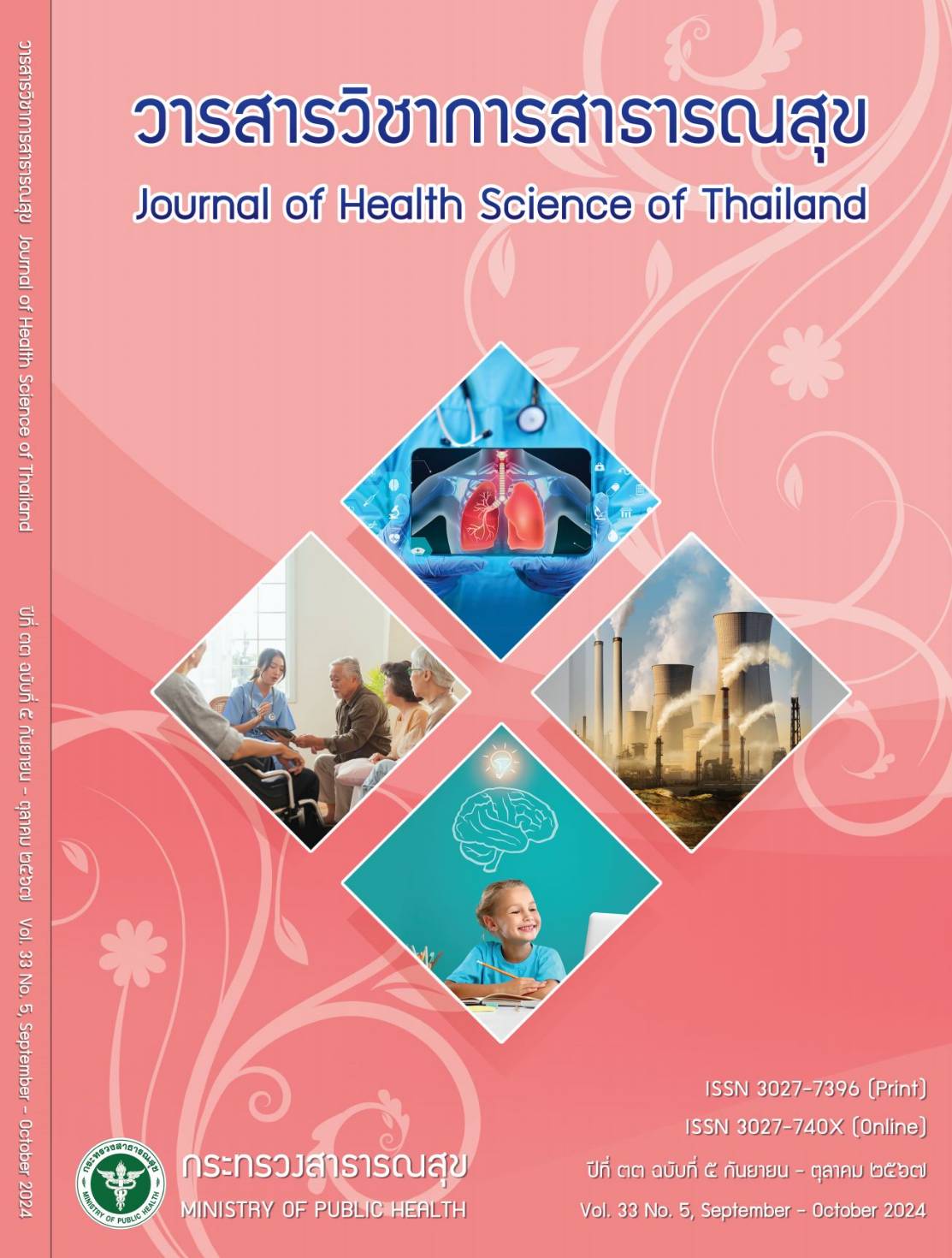Exploring the Effects of Establishing a Psychiatric Ward in Hatyai Regional Hospital
คำสำคัญ:
บริการสุขภาพจิต, การดูแลแบบสหวิชาชีพ, แนวโน้มการส่งต่อ, หอผู้ป่วยจิตเวชบทคัดย่อ
โรคทางจิตเวชและการใช้สารเสพติดในประเทศไทย สร้างภาระอย่างมากต่อทรัพยากรด้านสาธารณสุข หอผู้ป่วยจิตเวชในโรงพยาบาลศูนย์ และโรงพยาบาลทั่วไป การปรับปรุงการเข้าถึงและดูแลแบบองค์รวมมีผลกระทบต่อผลลัพธ์ของผู้ป่วย และประสิทธิภาพของระบบสาธารณสุขในประเทศไทย ยังไม่ได้รับการศึกษาอย่างละเอียด การศึกษานี้มีวัตถุประสงค์เพื่อเปรียบเทียบลักษณะทางประชากรศาสตร์ ลักษณะทางคลินิก และอัตราการส่งต่อของผู้ป่วยก่อนและหลัง การจัดตั้งหอผู้ป่วยจิตเวช รวมทั้งประเมินผลกระทบของหอผู้ป่วยต่อผลลัพธ์ของผู้ป่วยโดยใช้การศึกษากึ่งทดลองแบบก่อน-หลังนี้ วิเคราะห์ข้อมูลจากผู้ป่วยที่ได้รับการรักษาในโรงพยาบาลตติยภูมิระหว่างปี พ.ศ.2562 ถึง พ.ศ.2567 โดยเปรียบเทียบลักษณะทางประชากรศาสตร์และคลินิก รวมถึงภาวะทางจิตเวชและทางร่างกาย อัตราการส่งต่อ และผลลัพธ์ก่อนและหลัง การจัดตั้งหอผู้ป่วยจิตเวช ในเดือนตุลาคม ปี พ.ศ. 2565 ใช้การวิเคราะห์อนุกรมเวลาแบบขัดจังหวะ เพื่อประเมินแนวโน้มการส่งต่อ และใช้สถิติเชิงพรรณนาเปรียบเทียบลักษณะและผลลัพธ์ของผู้ป่วย ผลการศึกษาพบว่า ผู้ป่วยทั้งหมด 783 ราย โดย 497 ราย ได้รับการรักษาก่อน และ 286 ราย หลังการจัดตั้งหอผู้ป่วย การวินิจฉัยหลักเปลี่ยนจากโรคจากการใช้สารเสพติด (ลดลงจากร้อยละ 78.7 เหลือร้อยละ 34.9) เป็นโรคจิตเภท (เพิ่มขึ้นจากร้อยละ 6.4 เป็นร้อยละ 33.2) ขณะที่โรคอารมณ์เพิ่มขึ้นจากร้อยละ 14.9 เป็นร้อยละ 24.1 ผู้ป่วยจำนวนมาก มีโรคทางกายร่วมด้วยซึ่งต้องการการดูแล ระยะเวลาการนอนโรงพยาบาลเฉลี่ยเพิ่มขึ้นจาก 2 วัน (IQR: 1-4) เป็น 13 วัน (IQR: 7-23, p<0.001) ขณะที่อัตราการกลับเข้ารับการรักษาซ้ำคงที่ (ร้อยละ 1.6 เทียบกับร้อยละ 2.8, p=0.258) ผลลัพธ์ทางคลินิกดีขึ้น โดยมีการลดลงของอาการทางจิตเวชและคะแนนแบบประเมินความเสี่ยงทางคลินิก (SAVE) เมื่อจำหน่าย อัตราการส่งต่อมีแนวโน้มลดลงแต่ไม่มีนัยสำคัญทางสถิติทันทีหลังจัดตั้งหอผู้ป่วย (การเปลี่ยนแปลง = -8.64 ร้อยละ 95 CT: -234 ถึง 307, p=0.848) และไม่มีการเปลี่ยนแปลงแนวโน้มอย่างมีนัยสำคัญ (การเปลี่ยนแปลงความชัน = -1.16 ร้อยละ 95 CT: -6.33 ถึง 4.01. p=0.656) ดังนั้น การจัดตั้งหอผู้ป่วยจิตเวชในโรงพยาบาลศูนย์ และโรงพยาบาลทั่วไป ทำให้สามารถให้การดูแลผู้ป่วยครอบคลุมทั้งด้านจิตเวชและร่างกายโดยทีมสหวิชาชีพอย่างมีประสิทธิภาพ ทำให้ผลลัพธ์การดูแลผู้ป่วยดีขึ้นอย่างมีนัยสำคัญ ขณะที่อัตราการาการส่งต่อมีแนวโน้มที่ลดลง การขยายหอผู้ป่วยจิตเวช และเพิ่มทรัพยากรในโรงพยาบาลศูนย์ และโรงพยาบาลทั่วไป จึงช่วยให้ผู้ป่วยเข้าถึงบริการและการดูแลรักษาอย่างต่อเนื่องได้มากยิ่งขึ้น
Downloads
ดาวน์โหลด
เผยแพร่แล้ว
วิธีการอ้างอิง
ฉบับ
บท
การอนุญาต

This work is licensed under a Creative Commons Attribution-NonCommercial-NoDerivatives 4.0 International License.







